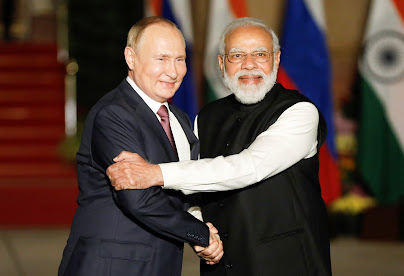
Prior to the St. Petersburg International Economic Forum, key trade links have been discussed at a forum in New Delhi. The “Russia-India Business Forum: Key Association for Advancement and Development’ opened in New Delhi on Wednesday.
The event, which is co-organized by the Roscongress Foundation of Russia and the Federation of Indian Chambers of Commerce & Industry (FICCI) of India, aims to increase bilateral trade from $31 billion last year to $50 billion this year. Other Indian affiliates are also involved.
Panelists from both countries, including politicians, bureaucrats, technocrats, and businesspeople, discussed strengthening trade ties and expressed hope that the two nations can make Greater Eurasia, a vast region with 93 countries and 5.4 billion people, a destination for emerging players in global trade and commerce. The two sides agreed that “ineffective” Western sanctions on Moscow’s military operation against Ukraine offer an opportunity for India and Russia to become dominant players in the region.
The two members of the Russian panel, President of the Technological Sovereignty Exports Association Andrey Bezrukov and Chairman of the Board of the Business Council for Cooperation with India Sergey Cheryomin, discussed the ongoing shift in regional geopolitics, stating that “a new era in global relations has dawned” and that “main trade flows are no longer directed westwards.” In addition, they called for the development of a new financial system to end the US dollar’s dominance over international trade.
Bezrukov expressed optimism regarding the possibility of opening new trade corridors in central Asia, powered by the Shanghai Cooperation Organization (SCO), based in Beijing. These corridors would go beyond the conventional Caspian Sea and Iran’s Strait of Hormuz to accelerate economic growth and development in the region and improve energy security.
Cheryomin criticized “Western colonialism in digital packaging” while urging Russia and India to become “leaders of a non-aligned tech movement.” The forum participants took aim at Western monopoly in the high-tech market. In light of the large numbers of employees being laid off by major US companies like Amazon, Alphabet, Microsoft, and Meta, he described it as a possible win-win situation for both parties.
It would be ideal for Russia and India to work together in the IT industry. Russia holds an edge in creating native innovation while India has been customarily falling short on innovative work in IT. He stated, “A joint collaboration could change the game.”
Rajiv Singh Thakur, Additional Secretary of the Department for Promotion of Industry and Internal Trade of the Indian Ministry of Commerce, concurred with Cheryomin and stated that knowledge transfer and joint development in the fields of cybersecurity and artificial intelligence (AI) may be advantageous to one another. The discussions were centered on IT companies in India and Russia that have complementary technological and human resources and want to achieve technological sovereignty by developing products and platforms that are shared by both countries.
India, which launched its own smart city program in 2015 and is expected to have 800 million people living in cities or urban agglomerations in 20 years, was used as an example by the Russian panelists as an example of smart-city technology. They used Moscow’s various e-government and e-citizen services, which are estimated to have saved each Muscovite three days of time last year, as a selling point. They likewise lauded the speed of the city’s development and improvement, saying Moscow’s “economy can measure up to a medium-sized European nation,” and featured that the capital’s “fantastic foundation, for example, 100 tram stations, and powerful computerized climate” could be copied in India.
The board additionally addressed computerized medical care as an area prepared for coordinated effort to support future and work on individuals’ personal satisfaction. The speakers talked about ongoing research into telemedicine, the fight against infectious diseases, and the growing trade in pharmaceuticals. Indian and Russian businesses are having discussions regarding the development of novel drugs, the use of nuclear medicine technologies, and the acquisition of active pharmaceutical ingredients.
Thursday marks the end of the two-day Russia-India Business Forum. The St. Petersburg International Economic Forum (SPIEF), whose 26th iteration will be held from June 14 to 17, organizes the foreign events program for this event.

